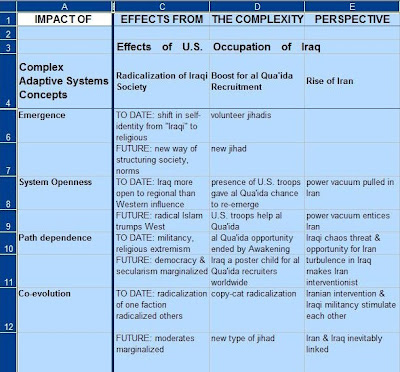The world is now faced with the problem of identifying the long-term implications for the confrontation between Islam and the West that follow from these three effects of the U.S. occupation of Iraq. The world has already suffered enormously as a result of endless confusion over the reasons for the continued U.S. presence in Iraq; the expectations about the impact of a U.S. withdrawal; and the degree to which Iraq was, is, or will be linked to the global jihad inspired by al Qua'ida. The depth and cost of this confusion demonstrates the urgency of achieving the best possible understanding of the future implications of the U.S. occupation.
Iraqi chaos will cause ferment throughout the Mideast for years to come as it draws country after country into highly competitive intervention in the Iraqi power vacuum. The Iraq-Iran relationship that attracts such American attention will be a microcosm of the broader regional situation. Iraq and Iran together make up a complex adaptive system, in which each state constitutes a smaller complex adaptive system. For one, this means that the two societies will evolve in response to each other. Neither has an immutable nature, nor will history repeat. Rather, each is evolving into something new, in part as a function of the evolution of the other. The table below, Impact of Effects from the Complexity Perspective, summarizes some of the developments that can be anticipated about the course of this evolution on the basis of various complexity theory concepts.

Complex systems theory offers roughly a dozen basic concepts that can be used to help interpret international affairs, and, more specifically, to give some rigor to thinking about the future of international affairs. Four of these are selected here to offer a systematic approach to applying complexity theory to international affairs:
- Emergence: the generation at one level (e.g., state) of counterintuitive behavior as the result of behavior at another level (e.g., individual);
- Openness: the susceptibility of a system to external influence;
- Path Dependence: the constraints on future behavior of past behavior;
- Co-evolution: the tendency of system components to evolve in response to each other.
Given the close links between Iran and Iraq that have proliferated since the U.S. invasion, the two countries can, particularly for the purposes of analyzing Iraq, be viewed as components of a single system. Some of the impacts on the Iraq-Iran system that can be classified under each concept are summarized in the table for events to date and anticipated future developments.
Iraq and Iran are systems open to external influence but constrained by path dependence. Influence today will have a far different impact than it would have had five years ago because of the constraints imposed by the path of socio-economic collapse into deprivation, instability, ethnic conflict, and religious radicalization. The two societies are now so intimately linked that they will almost certainly co-evolve on many levels, each stimulating changes in the other. This may but does not necessarily mean that they will become increasingly similar, but whether the evolutionary stimuli tend to repel or attract, the two societies seem likely to remain tightly bound together for the foreseeable future.
One of the key lessons of complexity theory is to think in terms of evolution or adaptability rather than stability or equilibrium. Assume change, possibly abrupt, and focus on how to prepare for and influence it rather than assuming stability and planting one's feet in the path of an avalanche. The analytical question then becomes one of how to antipate change. We have seen the emergence in the Islamic world of a global jihad and the emergence in Iraq of ethnic self-identification replacing Iraqi self-identification. Can we develop an analytical process for anticipating the next new set of norms, new socio-political structure, or new form of behavior? In a word, can concepts such as co-evolution and path dependence help us to anticipate the emergence of the next surprise?

No comments:
Post a Comment